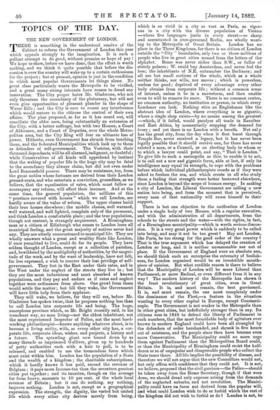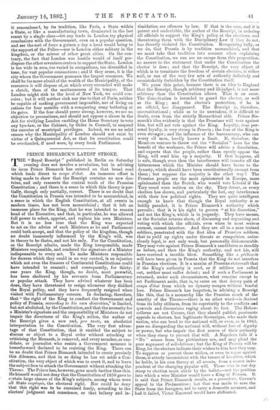TOPICS OF THE DAY.
• THE NEW GOVERNMENT OF LONDON. THERE is something in the understood resolve of the Cabinet to reform the Government of London this year -which appeals strongly to the imagination. It is such a gallant attempt to do good, without promise or hope of pay 1 We hope to show, before we have done, that the effort is worth making, and we think it quite possible that before the dis- cussion is over the country will wake up to a certain enthusiasm for the project ; but at present, opinion is just in the condition in which most popular Governments let things alone. No great class particularly wants the Metropolis to be vivified, and a great many strong interests have reason to dread any innovation. The City proper hates Mr. Gladstone, who not only threatens the ascendancy of the plutocracy, but will not even give opportunities of pleasant plunder in the shape of Water Bills ; and the City is sure to resent any interference which would restore to the citizens the control of their own affairs. The plan proposed, so far as it has oozed out, will conciliate the abler men, being substantially an extension of the City, with a better suffrage, but with two Houses, a Court of Aldermen, and a Court of Deputies, over the whole Metro- politan area, but the City Ring will fear an ultimate loss of power. Hitherto, even Government has shrunk from touching them, and the federated Municipalities which look up to them as defenders of self-government. The Vestries, with their thousand dependants, will be all alarmed, indignant, or doubtful ; while Conservatives of all kinds will apprehend by instinct that the waking of popular life in the huge city may be fatal to the ascendancy they always claim, but did not even under Lord Beaconsfield possess. There may be resistance, too, from the great nobles whose fortunes are derived from their London ground-rents, and who entertain a conviction, groundless, as we believe, that the equalisation of rates, which must follow or accompany any reform, will affect their incomes. And at the same time, the general population, the millions of this " province covered with houses " which we call London, are hardly aware of the value of reform. The upper classes build their true homes elsewhere; the middle classes, well warmed, well watered, and well lighted, complain only of the pavement, and think London a comfortable place ; and the true population, though not content, is strangely acquiescent. A Birmingham man or a citizen of Edinburgh who comes to London loses all municipal feeling, and the great majority of natives never had any. They are utterly unaccustomed to municipal life. They are wholly unaware what a great and wealthy State like London, if once permitted to live, could do for its people. They have seldom thought of London, except as a collection of parishes, and, bewildered by the multiplicity of authorities, by the magni- tude of the work, and by the want of leadership, have not felt, far less expressed, a wish to recover their lost privilege of self- government. They fret in the East under their rates, and in the West under the neglect of the streets they live in ; but they are the most industrious and most absorbed of known populations, and they pay and endure as if rates and neglect together were ordinances from above. One growl from them would settle the matter ; but till they wake, the Government will have little help from their applause. They will wake, we believe, for they will see, before Mr. Gladstone has spoken twice, that he proposes nothing less than to call London into corporate life and being. The huge, amorphous province which, as Mr. Bright recently said, in his trenchant way, no man living—not the oldest inhabitant, not the most experienced Inspector of Police, not the most hard- working philanthropist—knows anything whatever about, is to become a living entity, with, as every other city has, a cor- porate life, corporate ideas, wishes, and projects, a history and a future. The sprawling giant now bound down by as many threads as imprisoned Gulliver, given up to hundreds of petty authorities each with a hair to pull, is to be released, and enabled to use the tremendous force which must exist within him. London has the population of a State and the wealth of a kingdom ; the charitable subscriptions, which it hardly knows it has paid, exceed the revenue of Belgium ; it pays more. Income-tax than the seventeen greatest cities put together ; and its taxation, though on the average far from heavy, amounts to 10 per cent. of the whole local revenue of Britain • but it can do nothing, say nothing, improve nothing. London is not, except as a geographical expression. The strength, the dignity, the varied but united life which every other city derives merely from being, which is so vivid in a city as vast as Paris, so vigor- ous in a city with the diverse population of Vienna. —where five languages jostle in every street—so sharp, and accentuated in over-governed Berlin, are wholly want- ing to the Metropolis of Great Britain. London has no- place in the Three Kingdoms, for there is no citizen of London outside the "City " boundaries, only two or three millions of people who live in great cities named from the letters of the alphabet. Rome was never richer than S.W., or fuller of stately palaces ; W. could buy Amsterdam, and never feel the- loss; the inhabitants of N.E. outnumber the Berliners ; and all are but small sections of the whole, which as a whole- neither thinks, nor wills, nor moves ; which is powerless, useless for good ; deprived of every advantage every other body obtains from corporate life ; without a common sense- of interest, unless it be in a snowstorm, and then unable• even to will to remove its snow. There is no common centre, no common authority, no institution or person, to which every Londoner can look. Nothing stirs an Englishman like the- abstract idea of London, where everything is so gigantic,. where a single shop exists—by no means among the greatest —which, if it failed, would paralyse all trade in Zanzibar and East Africa, by momentarily stopping the demand for ivory ; and yet there is no London with a breath. Not onl y has the great city, from the day when it first burst through. Temple Bar, never received a legacy, but it has never been. legally possible that it should receive one, for there has never existed a man, or a Council, or an electing body to whom or to which a lawyer could point, and say, " That is London.' To give life to such a metropolis as this, to enable it to act, is to call out a new and gigantic force, able at last, if only its intelligence may equal its strength, to cope with the problems before which individual philanthropists recede as if they were asked to freshen the sea, and which create in all who study them a feeling that strength were better bestowed elsewhere, since London is beyond the scope of human energy. In making- a city of London, the Liberal Government are calling a new nation into being, and from the moment that is perceived, every man of that nationality will rouse himself to their support.
There is but one objection to the unification of London, under a single body of two Houses, with a regular executive,. and with the administration of all departments, from the- schools to the streets and the water—with the rights, in fact, of a Birmingham municipality—which is worth serious discus- sion. It is a very great power which is suddenly to be called into being, and may it not be too great ? May not London, like Paris, be too strong for the good order of the country ? That is the true argument which has delayed the creation of London so long, and it is neither unreasonable nor out of place. If the Government of England were an absolute one, we should think such an enterprise the extremity of foolish- ness, for London organised would be an irresistible mouth- piece of opinion. But what credible reason is there to believe that the Municipality of London will be more Liberal than Parliament, or more Radical, or even different from it in any way I The modern history of the Metropolis has shown it the least revolutionary of great cities, even in Great• Britain. It is, and must remain, the best garrisoned. It is, and must remain, the one most completely under the dominance of the Fleet,—a feature in the situation wanting to every other capital in Europe, except Constanti- nople. The Government is not weaker in the Metropolis than in other great cities, but indefinitely stronger than in any. Its citizens rose in 1848 to defend the liberty of Parliament in such numbers, that the most formidable body of agitators ever known in modern England could have been all strangled by the defenders of order barehanded, and shrank in five hours out of existence, and the people since then have become even more Conservative. The Municipality could no more urge them against Parliament than the Metropolitan Board could, or than the Municipality of Birmingham could resist the half- dozen or so of unpopular and disagreeable people who collect the State taxes there. All life implies the possibility of disease, and therefore we will not argue that the new Councillors would not, but only affirm with confidence that they could not. It is not, we believe, proposed that the civil garrison—the Police—should be taken away from the Home Secretary, though if that were done, we should dread only expense arising from the demands of the neglected suburbs, and not revolution. The Munici- pality could have no force not derived from the popular will, and what could London wish to do or forbid which the rest of the kingdom did not wish to forbid or do I 'London is not, be
it remembere I, by its tradition, like Paris, a State within a State, or like a manufacturing town, dominated in the last resort by a single class—let any trade in London try physical conclusions with the Government, even on a popular question, and see the sort of force a guinea a day a head would bring to the support of the Police—nor is London either solitary in the kingdom, or the mirror of other great cities. On the con- trary, the fact that London was hostile would of itself pre- dispose the other seventeen centres to support the State. London is too wide in area, too varied in occupations, too diversified in tone, for vast popular commotions ; and if they arose, it is the city where the Government possesses the largest resources. We shall be far more afraid of the wealth of the Municipality, of the resources it will dispose of, at which every scoundrel will make a clutch, than of the mutinousness of its temper. That London might sink to the level of New York, we could con- ceive ; but it will neither sink nor rise to that of Paris, neither be capable of making government impossible, nor of living on rations for four months with a conquering army battering at its gates. If the fear should prove strong, however, we see no objection to precautions, and should not oppose a clause in the Act for vivifying London enabling the Home Secretary to veto any bye-law, or the Cabinet, by Order in Council, to suspend the exercise of municipal privileges. Indeed, we see no solid reason why the Municipality of London should not exist by virtue of a Quinquennial Act, so that its constitution could be overhauled, if need were, by every fresh Parliament.







































 Previous page
Previous page